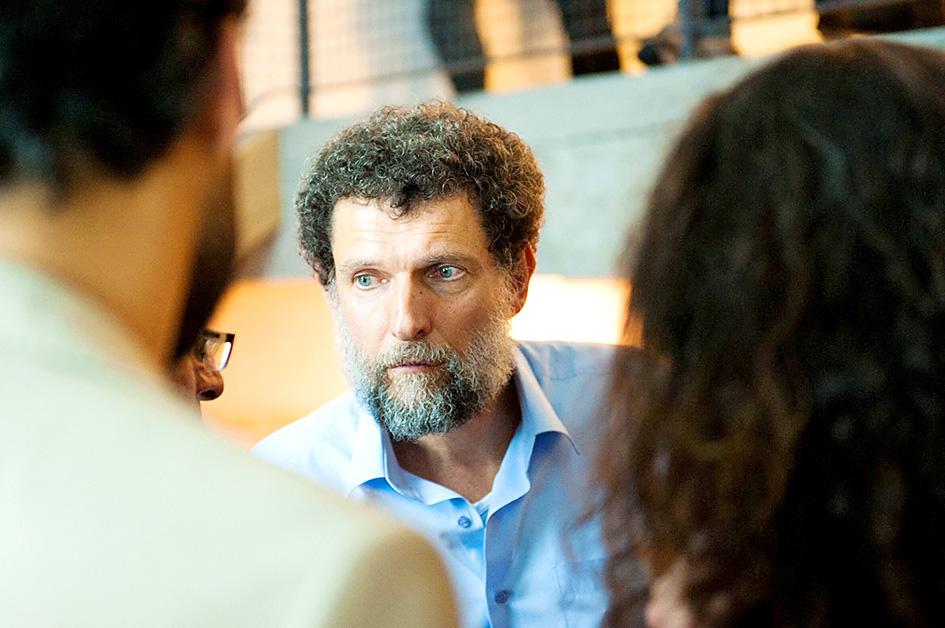Turkish President Recep Tayyip Erdogan on Saturday said that he had ordered 10 foreign ambassadors who called for the release of a jailed philanthropist to be declared persona non grata.
The envoys, including the US, French and German representatives in Ankara, issued a statement earlier this week calling for a resolution to the case of Osman Kavala, a businessman and philanthropist held in prison since 2017, despite not having been convicted of a crime.
Describing the statement as an “impudence,” Erdogan said he had ordered the ambassadors be declared undesirable.

Photo: AFP / Anadolu Culture Center
The diplomats, who also include the ambassadors of the Netherlands, Canada, Denmark, Sweden, Finland, Norway and New Zealand, were summoned to the Turkish Ministry of Foreign Affairs on Tuesday.
Kavala, 64, was acquitted last year of charges linked to nationwide anti-government protests in 2013, but the ruling was overturned and joined to charges relating to a 2016 coup attempt.
International observers and human rights groups have repeatedly called for the release of Kavala and Kurdish politician Selahattin Demirtas, who has been jailed since 2016.
They say their imprisonment is based on political considerations.
After Erdogan’s order was reported, the US State Department said in a statement that “we are aware of these reports and are seeking clarity from the Turkish Ministry of Foreign Affairs.”
Kemal Kilicdaroglu, leader of the main opposition Republican People’s Party, said Erdogan was “rapidly dragging the country to a precipice.”
Sinan Ulgen, chairman of Istanbul-based think tank Edam, said Erdogan’s timing was incongruous, as Turkey was seeking to recalibrate its foreign policy away from episodes of tension in recent years.
“I still hope that Ankara will not go through with this,” he wrote on Twitter.
Additional reporting by Reuters

‘CORRECT IDENTIFICATION’: Beginning in May, Taiwanese married to Japanese can register their home country as Taiwan in their spouse’s family record, ‘Nikkei Asia’ said The government yesterday thanked Japan for revising rules that would allow Taiwanese nationals married to Japanese citizens to list their home country as “Taiwan” in the official family record database. At present, Taiwanese have to select “China.” Minister of Foreign Affairs Lin Chia-lung (林佳龍) said the new rule, set to be implemented in May, would now “correctly” identify Taiwanese in Japan and help protect their rights, the Ministry of Foreign Affairs said in a statement. The statement was released after Nikkei Asia reported the new policy earlier yesterday. The name and nationality of a non-Japanese person marrying a Japanese national is added to the

AT RISK: The council reiterated that people should seriously consider the necessity of visiting China, after Beijing passed 22 guidelines to punish ‘die-hard’ separatists The Mainland Affairs Council (MAC) has since Jan. 1 last year received 65 petitions regarding Taiwanese who were interrogated or detained in China, MAC Minister Chiu Chui-cheng (邱垂正) said yesterday. Fifty-two either went missing or had their personal freedoms restricted, with some put in criminal detention, while 13 were interrogated and temporarily detained, he said in a radio interview. On June 21 last year, China announced 22 guidelines to punish “die-hard Taiwanese independence separatists,” allowing Chinese courts to try people in absentia. The guidelines are uncivilized and inhumane, allowing Beijing to seize assets and issue the death penalty, with no regard for potential

‘UNITED FRONT’ FRONTS: Barring contact with Huaqiao and Jinan universities is needed to stop China targeting Taiwanese students, the education minister said Taiwan has blacklisted two Chinese universities from conducting academic exchange programs in the nation after reports that the institutes are arms of Beijing’s United Front Work Department, Minister of Education Cheng Ying-yao (鄭英耀) said in an exclusive interview with the Chinese-language Liberty Times (the Taipei Times’ sister paper) published yesterday. China’s Huaqiao University in Xiamen and Quanzhou, as well as Jinan University in Guangzhou, which have 600 and 1,500 Taiwanese on their rolls respectively, are under direct control of the Chinese government’s political warfare branch, Cheng said, citing reports by national security officials. A comprehensive ban on Taiwanese institutions collaborating or

STILL COMMITTED: The US opposes any forced change to the ‘status quo’ in the Strait, but also does not seek conflict, US Secretary of State Marco Rubio said US President Donald Trump’s administration released US$5.3 billion in previously frozen foreign aid, including US$870 million in security exemptions for programs in Taiwan, a list of exemptions reviewed by Reuters showed. Trump ordered a 90-day pause on foreign aid shortly after taking office on Jan. 20, halting funding for everything from programs that fight starvation and deadly diseases to providing shelters for millions of displaced people across the globe. US Secretary of State Marco Rubio, who has said that all foreign assistance must align with Trump’s “America First” priorities, issued waivers late last month on military aid to Israel and Egypt, the